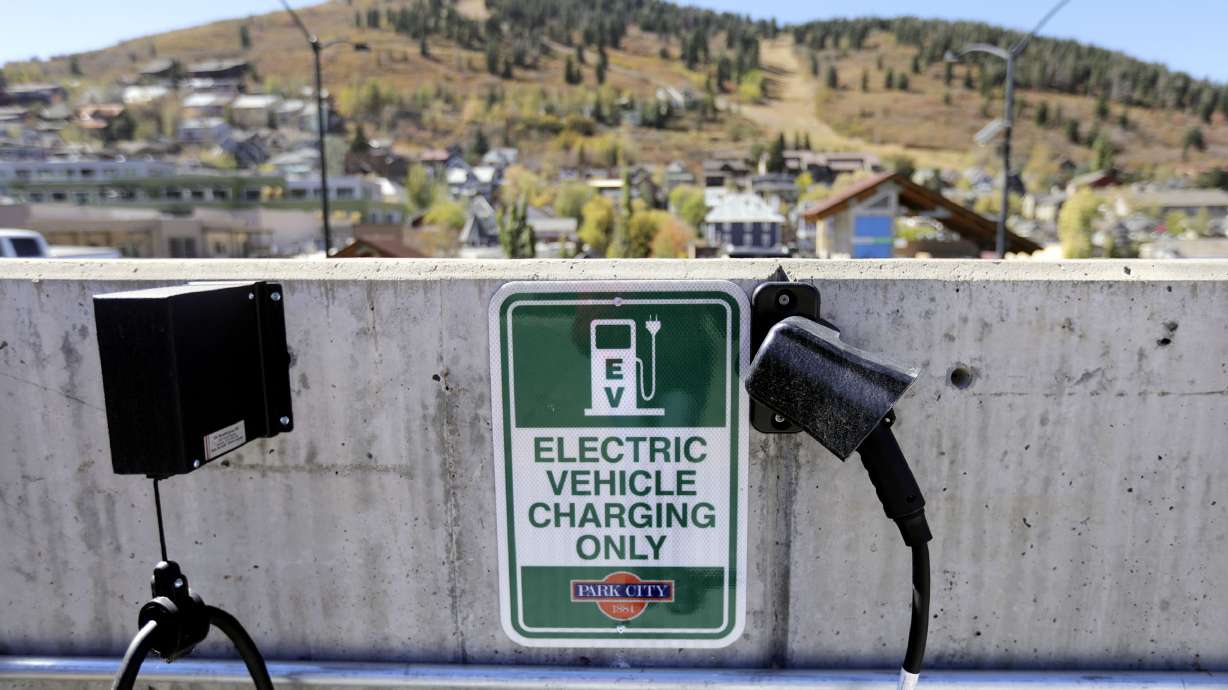Estimated read time: 3-4 minutes
This archived news story is available only for your personal, non-commercial use. Information in the story may be outdated or superseded by additional information. Reading or replaying the story in its archived form does not constitute a republication of the story.
SALT LAKE CITY — Miles and miles of scenic roads boasting mountains shooting into the sky, sprawling red rock deserts, lush forests and rushing rivers that are symbolic of the Mountain West are usually seen as a dream for travelers.
Unless, of course, you're traveling through these rural areas in an electric vehicle in need of a charge.
The ChargeWest project — an eight-state collective made up of Utah, Montana, Colorado, Idaho, Wyoming, Nevada, Arizona and New Mexico — hopes to change all that by working together to build electric-vehicle-friendly corridors through the idyllic landscapes.
Salt Lake City and Utah leaders alike gathered at the Packsize headquarters on Tuesday to announce the launch of West Electric Highway, the largest corridor collective in the U.S.
"The Intermountain West is becoming one of the most visited places in the United States," said Tammie Bostick, executive director of Utah Clean Cities and ChargeWest project lead. "We want the modern traveler to experience the same highways and byways of our western heritage with today's new electric fuel horsepower."
Bostick said that the plan for electric vehicle corridors throughout the Mountain West was put in motion around seven years ago when politicians and environmental activists came together with a vision of working together to ensure charging capabilities as residents and visitors travel through states.
"The ChargeWest project emphasizes working with our rural communities, working with our end-of-the-road places, so that when you drive your car from Salt Lake City to a national park, you can know that when you arrive, you'll have EV charging," Bostick said.
Utah Gov. Spencer Cox weighed in on the project via a video, noting that Utah and Colorado led the initiative as the first two states to sign the original REVWest memorandum of understanding that would eventually become the ChargeWest project.
The decision to electrify Mountain West roads is a timely one, as well.
Cox said that by 2025, consumers will see more than 100 types of electric vehicles on the market with ranges exceeding 600 miles — perfect for exploring the vast landscapes confined in the eight states.
I don't think that civilization and our economy will continue to exist forever if we don't switch to zero-emission and also zero fossil fuel transportation.
–Hanko Kiessner, Packsize CEO and co-founder and chairman at Leaders for Clean Air
"We can now see a future where we can take a road trip in our electric vehicle with range confidence, and this confidence allows us to travel off the interstates to highways that lead to rural towns, remote national parks and even to the next state, fully charged and returned home, ready for the next trip," Cox said.
He added that the Beehive State is currently home to 94 DC fast chargers, with "many more coming" through state and federal projects.
Speaking to Salt Lake City's climate-driven initiatives — the city in 2014 was named a Climate Action Champion Community by the Environmental Protection Agency — Mayor Erin Mendenhall said that "climate and the air that we breathe every day," is why she came into her work as a politician and what keeps her going.
"Salt Lake City is working across a lot of fronts to reduce our air pollution and act on climate. Fortunately, those goals are mutually beneficial," Mendenhall said. "You do one and it supports the other."
Projects like ChargeWest certainly fit that bill.
"I don't think that civilization and our economy will continue to exist forever if we don't switch to zero-emission and also zero fossil fuel transportation," said Hanko Kiessner, Packsize CEO and co-founder and chairman of Leaders for Clean Air.
He added that the ChargeWest project is only adding to what is already a growing network of electric vehicle corridors throughout the U.S.
"So basically, we can go anywhere in the United States now with zero emission and zero pollution," Kiessner said.
The project is administered by Utah Clean Cities, combining the efforts of over 75 partners and funded by the Department of Energy Vehicle Technologies Program and supported by the National Association of State Energy Officials.









